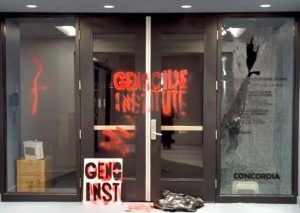The Alex Dworkin Canadian Jewish Archives recently hosted a group of student researchers led by Concordia University history professor Barbara Lorenzkowski, who is exploring the experience of children in wartime Canada.
“This was the first time we have welcomed such a large group at our new location in Côte-des-Neiges, and we were very pleased to note how well the space was suited to this type of use,” said archives director Janice Rosen.
The archives, formerly the Canadian Jewish Congress (CJC) national archives, moved one year ago from its longtime premises in the downtown Samuel Bronfman Building, now owned by Concordia, to a commercial building on Jean Talon Street, near Victoria Avenue.
The larger, airier space is more conducive to such visits than the old facility was.
A part of their seminar on the history of childhood, the 12 graduate and BA honours students were particularly interested in looking at the case files of the War Orphans Immigration Project, a series within the United Jewish Relief Agencies (UJRA) collection, housed at the archives.
Bringing Jewish children and teens who had lost their parents during the Holocaust to Canada was a project spearheaded by CJC and carried out under the auspices of the UJRA from 1947 through the early 1950s. Ultimately, more than 1,000 young survivors came here. Under the guidance of the archives staff and Lorenzkowski, each student was given the opportunity to explore a box of files from extensive holdings pertaining to this project in detail.
The group also heard a presentation by Rosen about a community initiative that brought an earlier group of Jewish war orphans to Canada in 1921, and compared some testimonies, translated into English from Yiddish, which were written by the Ukrainian and Polish orphans almost a century ago.
“The class concluded with the students presenting their impressions of the files they had explored. Hearing about the details that resonated with these students was an educational experience for us as well,” said Rosen.
Two more university classes are scheduled to visit in the coming months.






